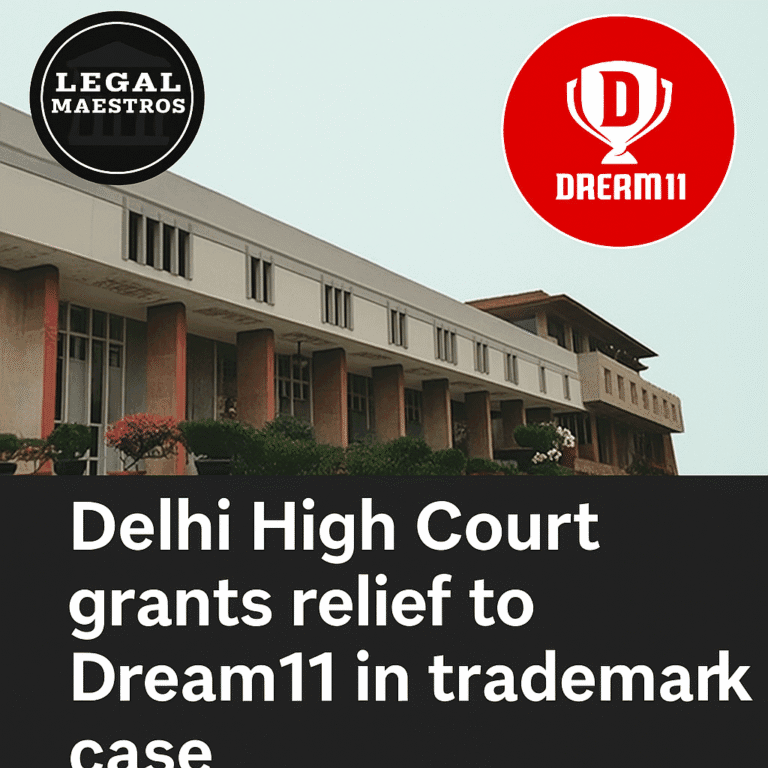
Delhi HC Halts Amazon's $39M Payment Order in Lifestyle Equities Trademark Case
Introduction
This article explains a recent Indian High Court judgment in simple terms. It shows how a well-known brand fought to protect its trademark and why the court looked closely at both the facts and the law.
Facts of the Case
Lifestyle Equities, owner of the legendary “Beverly Hills Polo Club” brand, discovered garments online that sported a dangerously similar logo. Amazon Technologies Inc. produced the products under the “Symbol” brand, and a reseller named Cloudtail retailed them on an e-commerce portal. Lifestyle purchased test products and verified that they carried a copy of its trademarked polo logo, leading to purchaser confusion.
Legal Provisions Involved
The principal legislation in this dispute is the Trade Marks Act, 1999, more precisely Section 29, which prohibits the use of any mark that is identical or deceptively similar to a registered trademark in relation to similar goods or services.
For any queries or to publish an article or post or advertisement on our platform, do call at +91 6377460764 or email us at contact@legalmaestros.com.
For More Updates & Regular Notes Join Our Whats App Group (https://chat.whatsapp.com/DkucckgAEJbCtXwXr2yIt0) and Telegram Group ( https://t.me/legalmaestroeducators )
The lawsuit was based on common-law rights to prevent passing off. By claiming infringement, Lifestyle sought an injunction (to halt sales), an account of profits, delivery up of infringing goods, and damages from the court.
Procedural Journey
Lifestyle filed suit in October 2020. Amazon Technologies Inc. did not appear in time, so the court proceeded against it ex parte (in its absence). Cloudtail admitted past infringement, stopped using the mark, and agreed to damages of about ₹4.8 lakhs.
For any queries or to publish an article or post or advertisement on our platform, do call at +91 6377460764 or email us at contact@legalmaestros.com.
The court removed the reseller, Amazon Seller Service, from the case. After those steps, only Lifestyle remained to present evidence against Amazon Technologies.
Key Issues Before the Court
The High Court had to decide two main questions. Firstly, the court had to determine if the polo player logo-branded products sold under Amazon’s “Symbol” brand violated Lifestyle’s trademark. Second, the court needed to determine whether due process had been followed during the trial, which proceeded without Amazon’s participation and resulted in damages being amplified many times beyond the amount claimed in the original pleadings.
Court’s Analysis
On infringement, the court juxtaposed the two logos and deemed the overall impression so similar that an ordinary consumer might be confused. By retailing these items under a private label brand on that same marketplace, Amazon Technologies had unfairly exploited Lifestyle’s goodwill.
For any queries or to publish an article or post or advertisement on our platform, do call at +91 6377460764 or email us at contact@legalmaestros.com.
Regarding the procedure, the court noted that Amazon failed to present any evidence or arguments due to its absence from the trial.
Decision
The High Court issued a stay on the enforcement of the large money decree, pending the hearing of the full appeal. The High Court acknowledged that requiring Amazon to make a payment before hearing could lead to substantial injustice. It stressed that trademark owners can enjoin others from using their marks and get damages.
Conclusion
This serves as a classic example of how brand owners can safeguard themselves against confusing copycats. confusing copycats. It underscores that courts demand due process. Every accused deserves a defense, and every money claim must be pleaded and proven. For businesses, the takeaways are twofold: honor other people’s IP, and watch legal steps so they can withstand scrutiny.
For any queries or to publish an article or post or advertisement on our platform, do call at +91 6377460764 or email us at contact@legalmaestros.com.






![JOB POST: Junior Associate at ASM Law Chambers, Jaipur [Freshers]](https://legalmaestros.com/wp-content/uploads/2025/11/Gemini_Generated_Image_8wrxer8wrxer8wrx-768x708.png)
